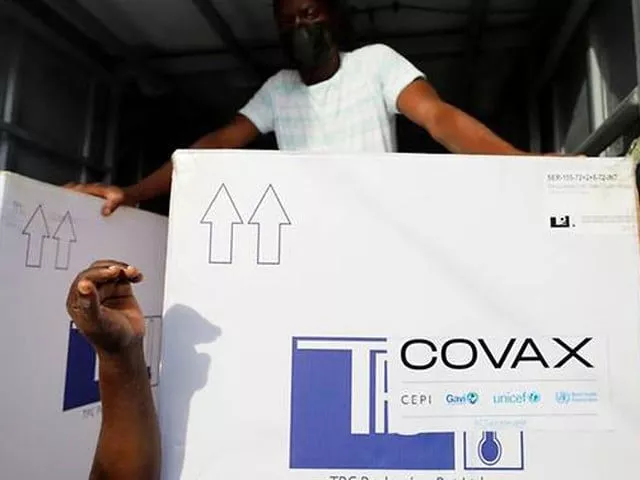Pakistan asks US help arrange Covid vaccine
Qureshi says holds discussion with US Congressmen on Afghan peace, Covid situation and Kashmir
NEW YORK:Foreign Minister Shah Mahmood Qureshi has sought the US role in arranging coronavirus vaccine for Pakistan as the country could not get supply committed under the World Health Organisation’s (WHO) COVAX because of excessive global demand.
Talking to the reporters in New York, the foreign minister said during his virtual interactions with US Congressman Tom Suozzi and Senator Lindsey Graham, he found that they wanted to engage with Pakistan as they could not deny Pakistan’s significance.
At his media interaction on Friday, Qureshi was accompanied by Pakistan Ambassador Asad Majeed Khan and Permanent Representative to UN Munir Akram. He said he discussed Covid situation, bilateral ties, as well as Palestine, Kashmir and Afghan issues with the US lawmakers.
Foreign Minister Qureshi also told reporters that that he sought the US role in arranging vaccine for Pakistan because the country could not get the supply committed under COVAX, owing to excessive global demand.
The foreign minister told reporters that Pakistan and the US have decided to enhance bilateral engagement by taking advantage of modern communication tools. “Therefore, a select group of Congressmen would hold a meeting with Pakistani authorities in June,” he said.
Also read: FO takes up vaccine issue with Saudi govt
“The Congressmen would also be invited for a meeting during the upcoming UNGA session, likely to be held physically. As a third step, they will be invited to Pakistan in October which will also help address their misconceptions about Pakistan, besides giving a better understanding about the country.”
The foreign minister arrived in the US along with his counterparts from Turkey, Palestine and Tunisia to address the special session of the United Nations General Assembly on deteriorating Palestine situation on Thursday.
The UNGA session was convened on the joint request from the OIC, Arab Group and NAM with a sole objective to improve the Palestinian situation with a ceasefire being the first step. Qureshi termed the session “effective and productive”.
Qureshi said that the Israel-Palestine ceasefire was the “first step towards improvement” but it required a constant vigilance by the Organisation of Islamic Cooperation (OIC), the Non-Aligned Movement (NAM) and the media to achieve its durability.
“Special vigilance will be required by OIC, NAM and the most important role is of media. You are free and your reporting can shake the conscience which did it as well and turned the tide,” Qureshi said, adding that the media helped change narrative but the pressure of public opinion must maintained.
He said that they had got the intimation of ceasefire during the UNGA session which followed debate and protests in various world capitals, triggered by the uncensored video clips shared by the citizen journalists.
The need for UNGA session arose as four UN Security Council sittings ended inconclusive and it failed to evolve any consensus, he said. He stressed that durable peace in South Asia and Middle East could not be achieved without resolving the Kashmir and Palestine disputes.
He told reporters that in his meetings with UN General Assembly President Volkan Bozkir and the Secretary General Antonio Guterres, he requested them to keep up their efforts till resolution of the dispute because “mere ceasefire was not enough”.
Responding to a question, the foreign minister said that Pakistan’s stance on the Palestine situation was to bring an end to killings, establish peace, resolve dispute through dialogue and pursuing the two-state solution.
Also read: Pakistan has received 4.06 million doses of Covid vaccines so far
He added that in his statement at the UNGA, he highlighted “complete similarities” between Kashmir and Palestine – both the people face killings, denial of right to self-determination, demographic restructuring, infrastructural destruction and economic collapse.
Asked about his remarks during his CNN interview on Thursday what the host said were “anti-Semitic”, the foreign minister said the accusation drew strong reaction not only from Pakistan but across the Muslim world. He said that the host looked to be under stress out of which she also addressed him as a diplomat. He added that he did not know whether her interaction was scripted.


COMMENTS
Comments are moderated and generally will be posted if they are on-topic and not abusive.
For more information, please see our Comments FAQ